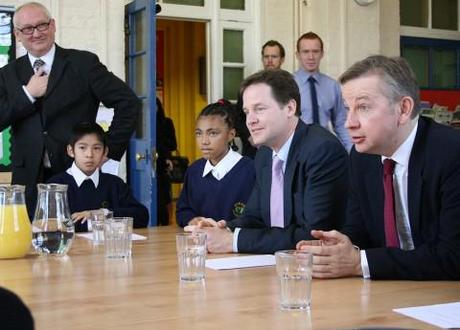 Nick Clegg and Michael Gove on a school visit. Photo Credit: Flickr.
Nick Clegg and Michael Gove on a school visit. Photo Credit: Flickr.
The background
Education Secretary Michael Gove’s reform of the GCSE system comes amid recent controversy over the raised grade boundaries for English GCSEs that left many with lower grades than expected.
Gove attacked the decision of examiners in Wales to re-mark these papers, declaring this would “undermine confidence” in the value of the qualifications obtained by the students involved. His new plans, meanwhile, aim to reinstate confidence in the examination system by making it both rigorous and fair.
But does anyone think they will?
Gove’s reform plan
The initiatives would involve an end to coursework and the current modular system, replacing it with an ‘all or nothing’ final exam at the end of two years. The plans will also put a halt to re-sit culture, which allows students to re-sit individual modules. Under Gove’s new scheme, students would be required to re-sit the entire exam, a move that is intended to deter most. Questions, ranging in difficulty, will also now be graded in an attempt to stretch bright pupils. Gove also has plans to have these exams run by a single exam board in order to reduce the risk of competition between boards resulting in easier exams.
First Clegg denounces, then supports plans
Gove’s path to GCSE reform has not been straightforward. Plans for a return to a two tier O-level system were prematurely leaked, causing uproar among the coalition. Lib Dem leader Nick Clegg was furious about the idea. The Daily Mail reports that “Mr Clegg accused Mr Gove of acting in an ‘insulting and patronising’ manner by failing to consult him in advance. Mr Clegg’s main objection was that this system would be ‘elitist’ and would ‘stigmatise’ children considered not bright enough.” The two are, however, now in agreement, though Clegg has forced Gove to delay changes until 2015. Clegg told Sky News that the new system would create “three simple things”: “Firstly, to give parents the confidence in the exams they are taking. Secondly, raise standards for all our children in schools across the country. Thirdly and crucially, not to exclude any children from the exam system. I think you can raise standards, increase rigour and confidence in our exam system but still do so in a way which is a single tier system which covers the vast majority of children in this country and that is the principle on which this whole reform will be based.”
Political response: ‘Largely positive’, but ‘unfair’ leaking
BBC News reported that former chief inspector of schools Sir Mike Tomlinson told BBC Radio 4′s Today programme that he thought the planned change was “largely positive”. Whilst he was largely in support of the abolition of the modular system and a single exam board, he also questioned how these changes would impact on subjects such as art or dance, which do not lend themselves to an ‘all or nothing’ final exam. The Guardian observed that the crux of Labour’s criticism was in the manner that these reforms were announced. Stephen Twigg, the shadow education secretary, complained, “It is inappropriate for an overhaul of GCSEs to be leaked while young people taking English GCSEs this year have been treated so unfairly, and are still in limbo…There has been no consultation on these plans, rather they have been drawn up in secret and leaked to select media outlets.”
Taking us back to widespread failure? Doesn’t go far enough?
Brian Lightman, of the Association of School and College Leaders, told Sky News, “What we’ve seen over recent years is more and more students having the opportunity to make progress and succeed. I am very worried about any idea of a system that would take us back to widespread failure, and people leaving school without any qualifications at all.” Yet Gove’s predecessor, Sir Kenneth Baker, criticised Gove for not being radical enough. He told The Independent that, when most students are leaving at 18, there should be no need for national testing at 16. Instead, he raised the idea of testing at 14, as a guide for students to better know what subjects to take: “It’s vital that schools and colleges provide education which develops practical skills and personal qualities as well as subject knowledge. This has to include opportunities to learn by doing.”
The “Queen” also seems to have an opinion on the matter.
Michael Gove on the phone. Says he’s scrapping GCSEs. Mr Clegg’s not happy; he’s only half way through his GCSE in pottery.
— Elizabeth Windsor (@Queen_UK) September 17, 2012

